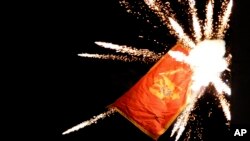Montenegro on Friday strongly denounced aggression against its embassy in Serbia during a protest by thousands of ultra-nationalists, saying the actions of soccer hooligans who threw flares and chanted "Set it on fire" represented an attack on the country's independence.
The crowd targeted the unguarded embassy in Belgrade and tried to burn the Montenegrin flag during the Thursday night protest of a religion rights law adopted by Montenegro's parliament last month. Serbs say the law discriminates against the Serbian Orthodox Church.
Montenegro Prime Minister Dusko Markovic tweeted that the embassy attack was an "uncivilized" act and another challenge to his small country's independence and freedom.
He said it was "stunning" Serbian police did not protect the embassy on Thursday or during other recent protests.
"We will save our Montenegro despite the hatred that is coming from the same actors inside and outside the country," Markovic said.
Montenegro split from much larger Serbia following a 2006 referendum. About one-third of the small Balkan country's 620,000 citizens declare themselves as Serbs and want close ties with Belgrade.
Led by the Serbian Orthodox Church and backed by Serbia's state propaganda, pro-Serb Montenegrins have been holding daily protest marches against the new religion rights law.
They say the law will allow the Montenegrin state to impound Serbian Orthodox Church property, including monasteries, churches and other assets. The Montenegrin government has repeatedly denied those claims.
Adding fuel to the fire in what appears to be the lowest point in relations between the former Balkan allies, Serbian President Aleksandar Vucic on Friday announced a "private visit" with Montenegrin Serbs for Orthodox Christmas, which is celebrated on Jan. 7.
He accused Montenegro's prime minister of a "notorious lie" — that the embassy in Belgrade was not protected during the rioting.
"We are not threatening Montenegro's independence, you are threatening sacred monuments that don't belong to you," Vucic said.
Montenegro's Foreign Ministry summoned the Serbian ambassador Friday to protest what it said was "an unhindered nationalist spree" against the flag and embassy.
Serbia's Foreign Minister Ivica Dacic said the ambassador rejected the note, because it is an attempt by Montenegro to shift the blame for the crisis between the two countries solely onto Belgrade.
He said the attempt to burn the Montenegrin flag is "counter productive" and "serves the interests of the enemies of the Serbian people."
U.S. Ambassador to Montenegro Judy Rising Reinke also commented.
"Shocked at the image of the desecrated (hash)Montenegro flag at the country's Belgrade Embassy," she said. "Attack on a diplomatic mission is absolutely unacceptable. Difference of opinions must be resolved through dialogue, not violence or acts of vandalism."
Members of the same Serbian soccer fan group, known as "Delije," were behind attacks against Western embassies in Belgrade in 2008, when the U.S. Embassy in Belgrade was set on fire as police stood close by. Then, the group was protesting a declaration of independence by Serbia's former Kosovo province.
Delije, Serbian for "tough boys," are known for close ties with current Serbia's ruling nationalist party and the secret police.




